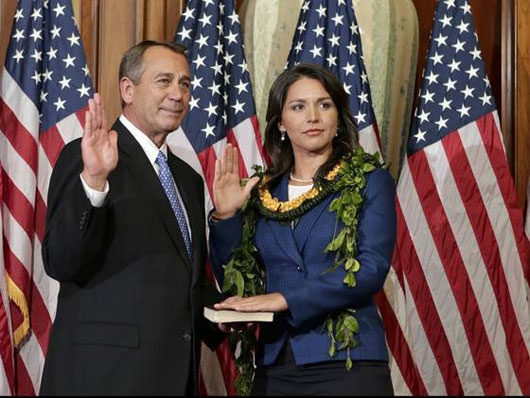Washington, DC. 10 January (Asiantribune.com) — Since the turn of this century and into the first decade there was much resentment for Hindu clergy offering prayers in the United States Congress feared by protesters that a nation founded in the Judeo-Christian roots may erode. A gentle and slow change of that attitude culminated this January 3 when a newly elected Congresswoman from the State of Hawaii was sworn in by Speaker Boehner using the Hindu sacred book in the well of the House.

Tulsi Gabbard, D-Hawaii, the first Hindu ever elected to the Congress, took her oath of office on the Hindu scripture the Bhagavad Gita, the American nation took another step forward toward the consolidation of ethnic and religious amity.
The Bhagavad Gita — or, in translation from Sanskrit, the Song of God — is the most important part of the Indian epic poem Mahabharata. The latter describes events that took place about 5000 years ago.
The Bhagavad Gita is a great philosophical work that played the same role in the history of India, as the New Testament did in the history of the countries of the European culture. Both these books powerfully proclaim the principle of Love-Bhakti as the basis of spiritual development of man. The Bhagavad Gita also presents us with a complete notion about such fundamental problems of philosophy as what man is, what is God, what the meaning of human life is, and what the principles of human evolution are.
The vast change in the attitude toward Hinduism in the American society is the teaching of Hindu doctrine of Ahimsa.
Ahimsa paramo dharma is an ancient Sanskrit formula meaning that ahimsa (nonviolence, wishing no harm) is highest dharma (ultimate law).
In the Hindu ethical code, ahimsa is a foremost virtue. It means that one should not hurt — mentally, physically, emotionally, morally, etc. — another being. Ahimsa doctrine is a unique contribution of Hinduism to ethics. It is sometimes thought of as a means of acquiring punya (merit). Moreover, ahimsa is one of the yamas (virtues/rules) a Hindu is supposed to practice. Panchatantra (around fifth century CE) says: “Ahimsa is the first moral law, from it all welfare grows. Therefore, protect even the mosquito, louse and the flea.”
This Hinduism and Buddhist doctrine is fast taking roots in the American society for Tulsi Gabbard to take her oaths on the sacred Bhagavad Gita in the well of the house in the Capitol building in Washington.
It has been well reported that when a Hindu priest from Ohio offered the first Hindu prayer in the U.S. House of Representatives in 2000, the socially conservative Family Research Council denounced the prayer as “one more indication that our nation is drifting from its Judeo-Christian roots.” When a Hindu societal leader Rajan Zed from Nevada offered the first Hindu prayer in the Senate in 2007, protesters from the anti-abortion group Operation Save America interrupted him, calling on Jesus to forgive the nation “for allowing a prayer of the wicked.”
Raised by a Hindu mother and a Catholic father in “a multiracial, multicultural, multifaith family,” Gabbard was exposed as a child to both the New Testament and the Bhagavad Gita. As a teenager, she embraced a Hindu identity and took the Gita as her guide.
And she took inspiration from the Gita to serve the American nation when she placed her hands on the sacred scripture last January 3.
When USA Today asked Ms. Gabbard how this teaching might apply to politics. Gabbard replied that the Gita teaches her to try “to maintain my equilibrium in either success or failure.” She then turned to Mahatma Gandhi: “The world’s most famous Hindu, Mahatma Gandhi … worked tirelessly for the welfare of his country and all of humanity without any thought of personal gain, leaving his ultimate success or failure in God’s hands.”
After she took oath of office when media pressed Congresswoman Gabbard, who was deployed twice to the Middle East with the Hawaii Army National Guard, about applying Krishna’s words to her own battlefield experiences, she initially said that the Gita isn’t really about war. The central topics of the Gita are, she said, “enlightenment, love for God, selfless service, and how each of us can succeed in our struggle on the ‘battlefields’ of life.” She then added that during wartime, she “found great comfort and shelter in the Bhagavad Gita’s message of the eternality of the soul and God’s unconditional love.”
Stephen Prothero a professor in Boston University’s religion department commented “As a religion professor, I see her swearing in as a “teachable moment” — a Hindu moment. But it could also be a time to shed some light from Asia onto American politics.”
– Asian Tribune –







“Tulsi Gabbard Wishes Happy Diwali” (http://www.youtube.com/watch?v=xzGlgyLkaic)
Very high standard of audio/video/speaking quality. A pleasure to watch. I’m sure that Lord Sri Krishna and Srila Prabhupada are very pleased with her.